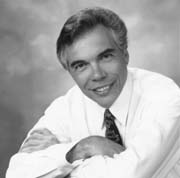
| ||
 | ||
 Adjunct Professor Joe Schwarcz |
Casting spells for scientific literacy
|
ELLYN KERR | Few people would say magic played a role in determining their careers.
But for a young Joe Schwarcz, science and magic melded when he witnessed a particular trick. "I was about 10 years old when I went to this birthday party," recalls Schwarcz. "There was a magician who tied three ropes together. Then he reached into his pocket, saying he was going to add a magic chemical. He made a sprinkling motion with his fingers -- and unravelled one long rope without any knots. "I remember that like it was yesterday because he said 'magic chemical.'" Aware that no such substance existed, Schwarcz was struck by the notion that chemistry could seem to others a thing of magic. Insofar as this also implies "esoteric," it is a notion he is trying to change. At an academic level, he says organic chemistry is the "central science from which everything else stems." But even non-scientists make scientific decisions, though they're often unaware of it. In fact, just about everything we do has a scientific aspect to it. "From simple things," says Schwarcz, "like whether you choose butter or margarine for your bread; whether you drink decaffeinated coffee, and by which decaffeination process; from the moment you open your eyes in the morning to when you go to sleep -- and even who you sleep with -- you're making scientific choices." Schwarcz holds an adjunct professorship in McGill's Department of Chemistry and is on the teaching staff at Vanier College, but much of his educational work occurs outside the classroom. Schwarcz hosts a weekly phone-in show about chemistry on CJAD in Montreal, contributes a weekly column called "The Right Chemistry" to The Gazette, and has a regular TV feature entitled "Joe's Chemistry Set" on the Discovery Channel. Recently he served as a consultant for a best-selling Reader's Digest book, Foods That Harm Ð Foods That Heal. He has earned a national reputation for his ability to convey that chemistry has as much to say about the contents of your fridge as it does about the contents of a lab. This year, Schwarcz received the James T. Grady-James H. Stack Award from the American Chemical Society, for his contributions to communicating chemistry to the public. This is the first time since the award was established in 1955 that it has been presented to someone outside the United States. Previous winners have included Isaac Asimov, New York Times columnist Walter Sullivan and Don Herbert, TV's "Mr. Wizard." Schwarcz is likely best known at McGill for "The World of Chemistry," a course he developed and teaches with fellow chemistry professors Ariel Fenster and David Harpp. The course boasts one of the highest enrolments of any elective at McGill and aims to bring a real-life component to chemistry. Students learn such things as why Tang drink crystals can be used to clean dishwashers (the citric acid that makes the drink tart also binds and removes calcium and magnesium build-up). Schwarcz's equating of teaching and performing no doubt contributes to the course's popularity. "A good lecturer is also an actor," he says. "A lecture should seem spontaneous, even if it's been given many times before." After that fateful birthday party, Schwarcz took up magic as a hobby. Other than a love of performance, magic has honed in him a healthy scepticism. Knowing how illusions work, he decries what he sees as a wave of marketers and frauds who mislead the public by laying false claim to scientific principles. He cites the example of "psychic doctors" who claim to remove tumours without incisions. With sleight of hand, these "doctors" instead produce blood-soaked cotton balls or chicken livers. Schwarcz actively criticizes this and other paranormal and psychic phenomena, as well as numerous marketing schemes for herbal and homeopathic remedies. But he says he always looks at the evidence before making up his mind. "I never start out with an a priori assumption that something cannot be simply because we don't have a rational way of explaining it." Radio waves, for instance, were once thought incapable of reaching one continent from another, because the waves travel in straight lines and the Earth is rounded. "No one would have predicted radio waves would bounce off the atmosphere," he says. According to Schwarcz, what is lacking is a general public scepticism of new age medicines and gimmicky diet schemes. He blames this on insufficient science education, and says the remedy lies in better education of elementary and high school science students, and even of teachers themselves. He concedes, however, that many people find chemistry unpalatable. "It kills me when people say they hated chemistry in school. So often I hear it was nothing more than formulas and incomprehensible equations. That's not what it should be." Schwarcz colours his lectures with historical anecdotes and real-life examples, "like the young man in England who killed himself with deodorant. He sprayed himself constantly, and in the end got hydrocarbon poisoning from the propane and butane propellants." It's teaching, with some magic thrown in. "You capture the audience's attention. Then, without their realizing it, you pump a little scientific information into their brains. Before they know it, they've learned something."
|
|
| |||||